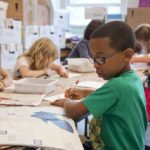 I’ve written previously about so-called “class transitioners”, who are able to engage across social class and therefore help organizations with socially diverse workforces capitalize on this diversity.
I’ve written previously about so-called “class transitioners”, who are able to engage across social class and therefore help organizations with socially diverse workforces capitalize on this diversity.
A recent survey from the University of Toronto explores whether such aptitudes are best cultivated in a public school environment. The study found that public school students were more likely to have what the researchers refer to as “open intercultural orientations” than their peers from private schools. Despite this, the research also suggests that many public schools place constraints in place that hamper intercultural relationships from forming.
Bridging the divide
The research was based on questions developed by Ontario Human Rights Commission during a 2017 survey that aimed to gauge people’s opinions on human rights.
The results show that public school students were more likely to be supportive of immigration, gender equality, and believe that discrimination is something we still need to tackle. This was especially so among students of schools where their peers didn’t share their ethnicity or religion.
What’s more, high levels of diversity were also strongly linked with intercultural friendships among students. The study also found that people who were members of groups that were often targets of discrimination were also less likely to have discriminatory views.
Making friendships
The research also highlights how pupils tended to make friendships via the programs they were enrolled in, as this brought them into contact with the same people on a regular basis.
This can be a challenge as some programs, such as for languages or specialized arts, can attract disproportionately white and wealthy. Such environments can hamper out ability to generate intercultural skills, which can in turn undermine our attempts to develop inclusive societies.
Indeed, it has been shown that when parents actively choose education programs based on things like measurable achievement outcomes, they’re in essence choosing programs that rank racialized privilege rather than anything specific about the teaching provided.
What’s more, students on such specialized programs often believe themselves to be more academic and motivated than their peers in regular programs, which creates the impression that they’re superior in various ways. As a result, the researchers question whether specialized programs may effectively sustain cultures of power and privilege.
If we want to create the kind of intercultural citizens that can bridge cultures in the workplace, then it’s important that our schools encourage a sense of belonging and allow different cultures to rub along together.